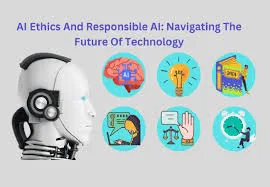The use of Artificial Intelligence (AI) is rapidly increasing across various sectors and is revolutionalizing industries including health, business, learning, and fun. Despite the numerous possibilities of AI, there are numerous ethical issues that arise due to the advancement of the technology.
Issues of concern regarding AI are bias, privacy, accountability and transparency as AI has become an integral part of society. As a result, the demand for professionals who can navigate these complex issues is rising, leading to the emergence of a new career path: AI ethicist positions.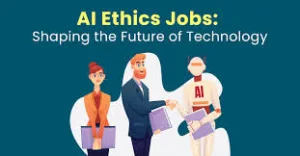
AI ethics jobs are centered on making sure that the use of AI is done rightly and in a manner that does not harm people or go against their rights. These roles entail tackling the ethics of AI, including the unethical use of the technology, for instance, bias, privacy, and the lack of accountability and transparency. Specialists in this field strive to develop standard procedures, rules, and paradigms regarding the appropriate utilization of AI technologies.
Key Responsibilities in AI Ethics Roles:
AI ethicists working in AI ethics positions have numerous obligations that encompass the understanding of technology and ethical standards. Some of the key responsibilities include:
1. Developing Ethical Guidelines and Policies
Developing a set of clear principles and rules that will help to prevent the development and use of AI systems that are immoral and wrongful. This includes assessing the risks of ethical dilemmas and guidelines for their avoidance.
2. Conducting Ethical Audits:
To ensure the ethical use of AI systems, one should conduct periodic checks on the systems. This involves analyzing the merits of the AI algorithms in terms of fairness, openness, and responsibility.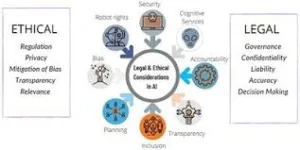
3. The Problem of Bias in Artificial Intelligence Systems:
Preventing AI models from reinforcing or even worsening biases that are present in our society by eliminating or alleviating the biases within AI models. This includes data set analysis for apparent bias and coming up with ways and means of minimizing such bias.
4. Data Protection and Information Security Challenge:
Actions are taken to prevent the misuse of user information as well as securing their privacy. This involves making regulations on collection, storage and use of data in an ethical or lawful manner.
5. Fostering Transparency and Explainability:
Trying to improve the clarity of AI technologies and make them user friendly. This includes figuring out ways to clarify how an AI algorithm makes decisions and ensuring that users trust the technology.
6. Consulting on the Ethical Impact of the AI Projects:
Offering a set of recommendations for organizations on how to address ethical issues in their AI projects. This entails the identification of the risks that could be associated with the project as well as the formulation of measures that can be taken to address them.
The Growing Demand for AI Ethics Professionals:
There is a rising concern for AI ethics specialization as companies understand the need for addressing the ethical impact of their AI strategies. Several factors are driving this demand:
1. Regulatory Pressure:
State and other supranational authorities pay attention to the ethical issues of AI usage. New policies and principles are now being set in place to govern the proper application of AI. It is for this reason, that organizations require individuals who are able to maneuver through these various legal terrains to promote and sustain compliance.
2. Public Scrutiny:
3. Corporate Social Responsibility:
Ethical AI has become a crucial element of many companies’ CSR policies. Thus, organizations should focus on ethical concerns as this will lead to the improvement of the company’s image and market position.
Skills and Qualifications for AI Ethics Jobs
AI ethics jobs demand the following skills and qualifications:
The field of AI ethics focuses on many skills and knowledge areas, and AI ethics roles need to have a background in technology, ethics, and policy. Some of the key skills and qualifications include:
1. Technical Knowledge
Knowing the characteristics of AI technologies such as machine learning, data science, and algorithms. This technical know-how is critical in determining the ethical ramifications of AI systems and the formulation of countermeasures.
2. Ethical and Philosophical Understanding
An understanding of the various ethical theories and principles with a focus on how they can be used in AI. These include factors like fairness, accountability, transparency, and privacy among others.
3. Regulatory and Policy Expertise
Other requirements include, understanding of the various legislations and policies governing AI and data privacy. This entails knowledge on the international regulatory environment and its constantly evolving rules.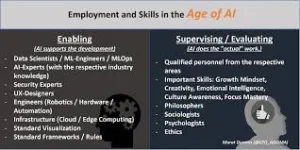
4.Analytical and Critical Thinking Skills
The ability to critically evaluate the ethical issues of AI systems and their possible repercussions. It is crucial to enhance the critical analysis of the issues in order to find the most effective and creative methods to address the ethical problems.
5. Communication and Advocacy Skills
The ability to express oneself and argue for ethical issues within organizations and businesses. This includes ensuring that one can convey technical information in a way that can be easily understood by other people who may not be in the same field.
Career Paths in AI Ethics:
These AI ethics jobs are not limited to any specific industry or company and can be pursued in a number of ways. Some of the common career paths in AI ethics include:
1. AI Ethics Researcher
Exploring the Ethical issues of AI and establishing ways of handling Ethical issues in the use of AI. These researchers can be based in universities, think tanks, or research centers.
2. AI Ethics Consultant
Assisting organizations in understanding the best practices and measures to ensure the ethical use of AI in their operations. Ethical consultants are hired by clients, including businesses, government entities and non profit organizations.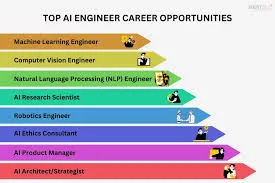
3. Ethics Officer
Managing the application of ethical AI within an organization. Ethics officers are the ones who set standards of ethical practice, investigate ethical issues, and monitor compliance with the set rules and regulations.
4. Data Privacy Officer
Stressing on the aspect of user privacy and data security. The primary responsibilities of data privacy officers include creating a framework for data gathering, retention and use and enforcing data protection laws.
5. Policy Advisor
Some of the roles include: Providing policy makers and stakeholders with guidance on the ethical issues arising from the use of AI and assist in formulation of policies and standards. Some of the typical employers of policy advisors include government departments, regulatory authorities, and advocacy organizations.


